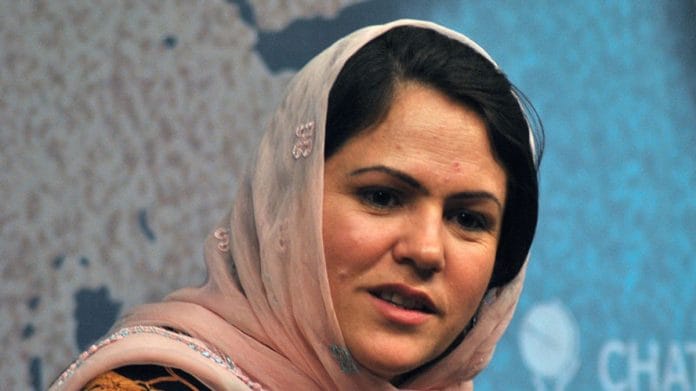New Delhi: For a country that has been facing war and conflict for over two decades, it is difficult to make its citizens take a virus seriously, said Afghan MP Fawzia Koofi, while talking about the challenges Afghanistan has to deal with during the Covid-19 pandemic.
During a virtual conference Friday evening organised by India Foundation, Koofi said the people in Afghanistan have two choices — “dying from poverty or from Covid-19”.
The country recorded a total of 24,102 coronavirus cases, and 451 deaths due to Covid-19 as of Saturday afternoon.
However, Koofi, currently serving as a member of Parliament in Kabul, said these numbers are likely under-represented as Afghanistan does not have enough testing capacity.
The country has conducted only 53,705 tests so far, she said.
Moreover, Koofi said there is a social taboo associated with the virus, which makes people afraid of reporting themselves sick.
“Most awareness programmes talk about how to prevent the infection. But there is very little information circulated on what a person should do when they get infected,” Koofi added.
Since most Covid-19 cases do not cause severe illness, patients can treat themselves at home. “But we need more awareness programmes on how such people should manage the disease,” she said.
Also read: India can’t afford to let the guard down on security in coronavirus. Kabul attack shows why
‘Afghans already frustrated with years of war, conflict’
Koofi pointed out Afghanistan shares a border with Iran, which was among the first countries to report coronavirus cases outside China.
The city of Herat, which lies close to the border of Iran and Afghanistan, was the first to record a Covid case in Afghanistan in March, Koofi said.
“From March, we imposed a lockdown in cities like Herat and Kabul. Schools and universities were also shut in March,” she said. However, the lockdown was not very successful, she added.
“Our people are already frustrated with the years of war and ongoing internal conflict. At the end of the month of Ramadan, people came out to celebrate the festival of Eid,” Koofi said.
Koofi also said the majority of the population that had been affected by Covid-19 in Afghanistan were daily wage workers, who had no choice but to go to work.
“Many among these are women who lost their husbands in the war. They work in other people’s homes to earn wages to feed their children,” she said.
Insurgency attacks during Covid
Afghanistan also saw an increase in violence and insurgency attacks over the last few months, Koofi said, adding that public places and civilians have been targeted in these attacks.
“For the first time, we had an attack on a maternity hospital during Ramadan.”
She said the internal conflict has become very complicated as no group has taken responsibility for these attacks.
“The financial pressure, together with insurgency, has made the lives of people (in Afghanistan) horrible during the lockdown,” Koofi said.
The country has been losing its people to war for decades, so people do not take the virus seriously, Koofi said.
“These people have to choose between dying from the virus or dying from poverty,” she added.
Also read: After Nepal, Bhutan, now Afghanistan & Maldives pledge support to SAARC COVID-19 fund
Taliban ‘affected’ by Covid
Responding to a question on whether it was true that the Taliban was helping the government in the fight against the virus, Koofi said the fact that this virus isn’t discriminatory meant that even the Taliban were affected by it.
“The Taliban is now allowing healthcare workers to reach out to people in remote areas during the pandemic,” Koofi said.
She also added since Eid, there seems to be an undeclared ceasefire from insurgency groups.
Covid status of Bangladesh, Sri Lanka
The conference was also attended by Shahriar Alam, deputy minister of foreign relations for Bangladesh, and Seetha Arambepola, member of Parliament in Sri Lanka.
Bangladesh has recorded over 80,000 coronavirus cases and over 1,000 deaths so far. Alam said all the preparations they have taken seem to be proving insufficient.
However, he added Bangladesh is learning from its mistakes. He said the country is now running fresh awareness campaigns to reiterate the importance of social distancing and hand-washing.
A team of experts from China is currently on a visit to the country to help deal with the crisis, Alam said.
Meanwhile, Sri Lanka — which just has 1,880 confirmed cases and 11 deaths as of Saturday afternoon — seems to be managing the crisis better.
Arambepola said the country had set up a task-force to fight Covid-19 back in January, even before the first coronavirus case was reported in the country.
She said the majority of the cases were ‘imported’ and the country still does not have a “social spread”.
There were only two clusters or hotspots in the country that had a large number of cases concentrated in a small area, Arambepola added.
Also read: India scored an own goal in great Afghan game by closing two consulates. Here’s how







Fawzia Koofi is not MP in Afghanistan now.